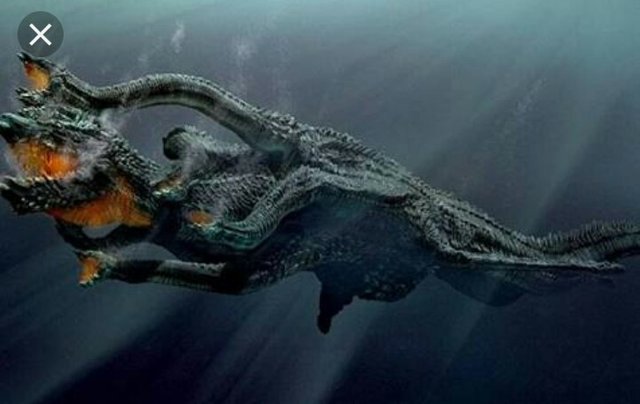
Leviathan (/lɪˈvaɪ.əθən/; Hebrew: לִוְיָתָן, Modern Livyatan, Tiberian Liwyāṯān) is a creature with the form of a sea monster from Jewish belief, referenced in the Hebrew Bible in the Book of Job, Psalms, the Book of Isaiah, and the Book of Amos.
The Leviathan of the Book of Job is a reflection of the older Canaanite Lotan, a primeval monster defeated by the god Hadad. Parallels to the role of Mesopotamian Tiamat defeated by Marduk have long been drawn in comparative mythology, as have been wider comparisons to dragon and world serpent narratives such as Indra slaying Vrtra or Thor slaying Jörmungandr, but Leviathan already figures in the Hebrew Bible as a metaphor for a powerful enemy, notably Babylon (Isaiah 27:1), and some scholars have pragmatically interpreted it as referring to large aquatic creatures, such as the crocodile. The word later came to be used as a term for "great whale" as well as of sea monsters in general.
Etymology and origins
The name is a derivation from the root לוה lvh "to twine; to join", with an adjectival suffix ן-, with a literal meaning of "wreathed, twisted in folds". Both the name and the mythological figure are a direct continuation of the Ugaritic sea monster Lôtān, one of the servants of the sea god Yammu defeated by Hadad in the Baal Cycle.
The Ugaritic account has gaps, making it unclear whether some phrases describe him or other monsters at Yammu's disposal such as Tunannu (the biblical Tannin).
Most scholars agree on describing Lôtān as "the fugitive serpent" but he may or may not be "the wriggling serpent" (bṯn ʿqltn) or "the mighty one with seven heads". His role seems to have been prefigured by the earlier serpent Têmtum whose death at the hands Hadad is depicted in Syrian seals of the 18th–16th century bce.
Sea serpents feature prominently in the mythology of the Ancient Near East. They are attested by the 3rd millennium bce in Sumerian iconography depicting the god Ninurta overcoming a seven-headed serpent. It was common for Near Eastern religions to include a Chaoskampf: a cosmic battle between a sea monster representing the forces of chaos and a creator god or culture hero who imposes order by force.
The Babylonian creation myth describes Marduk's defeat of the serpent goddess Tiamat, whose body was used to create the heavens and the earth.
Thanks for Visiting my Blog today.
Kindly upvote, reesteem, and comment if you find this post useful.
Picture sourced from Google.
Congratulations @kebieri123! You have completed the following achievement on Steemit and have been rewarded with new badge(s) :
Click on the badge to view your Board of Honor.
If you no longer want to receive notifications, reply to this comment with the word
STOPDownvoting a post can decrease pending rewards and make it less visible. Common reasons:
Submit
Hi! I am a robot. I just upvoted you! I found similar content that readers might be interested in:
https://en.wikipedia.org/wiki/Leviathan
Downvoting a post can decrease pending rewards and make it less visible. Common reasons:
Submit